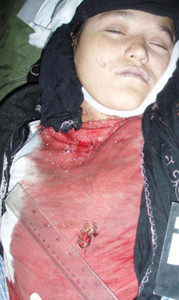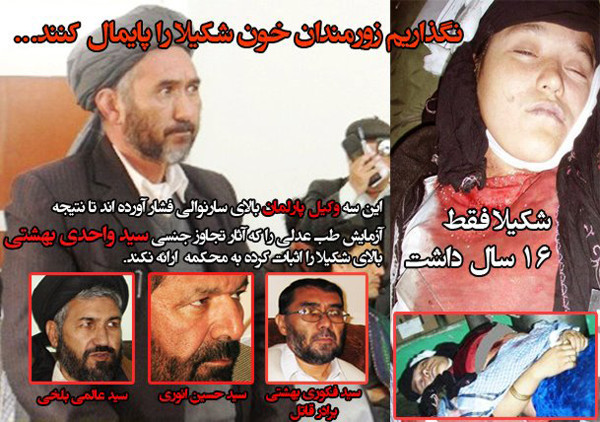Afghan teenager Shakila was shot in the back 13 months ago in the house where she worked as a maid for a wealthy local leader in one of the most progressive provinces of Afghanistan.
Her murderer has never been arrested, and her family’s search for justice has laid bare the complex web of grinding poverty, attitudes towards women and a culture of immunity that plagues much of the country’s legal system.
As International Women’s Day was marked yesterday, campaigners say that progress in Afghanistan is slow even after billions of dollars of Western aid and some advances since the 2001 fall of the hardline Taliban regime.

Shakila's dead body drenched in blood. She was raped and killed in cold blood.
The departure of the NATO coalition next year has also raised fears that the limited improvements for women could be erased as conservative groups vie to seize power in Kabul.
Shakila, whowas about 16, spent the last six months of her life working for a member of the provincial council in Bamiyan, the quiet Afghan town 180 kilometres west of Kabul.
Her family were poor and they needed the money from her job, but her body was found in her employer’s home in January 2012.
“Investigators told us that she had been shot in the back,” her 18-year-old brother, Mohammad Alam Sadiqat, told AFP. “And doctors said that she had been raped.”
In a country where an unmarried women’s virginity is sacrosanct, the shame of having a daughter raped adds to the family’s burden, but they dare not make an official accusation of sexual abuse.
Most Afghan female rape victims never publicly name their attacker, out of fear of being ostracised or even killed, campaigners say.
Investigation
Shakila’s brother-in-law, who works as a guard in the same house, was imprisoned for six months in connection with her murder, then released.
Esmail Zaki, the coordinator of a local charity, then started to investigate.
“We found out that the attorney general and the judicial system had gone in the wrong direction. They had evidence that the guy (the brother-in-law) was not even there when it happened,” Zaki told AFP.
Shakila’s murder was never brought to court in Bamiyan. It has since been referred to the attorney general’s office in Kabul, which could not be reached by AFP.
The family owners of the home have denied having anything to do with murder, and the Bamiyan police have washed their hands of responsibility.
“We did all the research we had to do. We finished that case and then handed it to the court,” said deputy provincial police chief Mohammad Ali Lagzi.
One senior official in the local administration told AFP on condition of anonymity that the family’s poverty meant the odds of getting justice were stacked against them.
“Her case has been taken to the AG’s office in Kabul but it seems not much has been done to give her justice,” he said.
“The murder happened in the home of a member of the provincial council,” he added. “They are powerful people.”
Reported cases of violence against women
Last December, the United Nations said Afghanistan had made progress in protecting women against violence and welcomed an increase in reported cases.

A photo circulating in the social networking websites reads on top of Wahidi Beheshti's photo: Let's not allow those responsible for Shakila's blood go unpunished! The caption on Shakila's dead body reads: Shakila was only 16-years old.
Below it shows the photos of three lawmakers in the parliament, from left to right Said Alimi Balkhi, Said Hussein Anwari and Said Fokori Beheshti (brother of the murderer) who are pressurizing the Court of Appeals in Bamyan province to free Wahidi Beheshti.
But in 16 of 34 provinces where the UN was able to gather details, just 21 percent of 470 reports of violence against women resulted in convictions.
“The situation is very difficult,” Ingibjorg Gisladottir, the UN women’s representative in Kabul, said.
“There’s a lack of genuine political will to take actions that can change women’s situation. Also, there’s a culture of impunity.
“It’s very unlikely that the perpetrators will be held accountable if they commit a crime against women. Some men think that women are like a property, like land or money.”
Bamiyan is arguably the most progressive province in Afghanistan. It is run by the country’s only female governor, Habiba Sarobi, and has the highest proportion of girls in school – 45 percent of 135,000 children.
The local government says reported cases of violence against women grew from 48 last year to 57 in 2012.
“It’s because of our public awareness campaign,” says Fatima Kazemi, head of women’s affairs at the provincial government.
“Now more women know that there are people who could help them, give them justice or defend their rights and thus more are going to police, authorities or rights groups when facing violence,” she added.
There are also small signs of change at the national level.
The Afghanistan Independent Human Rights Commission says there has a sharp increase in the number of cases reported: 5,701 in the first 11 months of the current year, which began on March 21, 2012, compared to 4,400 in the last.
Latifa Sultani, who works for AIHRC, says women in the cities of Afghanistan are more aware of their rights.
“But in rural provinces, they can’t go anywhere to complain,” she said, voicing frustration with the double standards that victimise women.
“If a man kills his wife, it’s two years of jail. But if a woman kills her husband, she can get up to 16 years of prison,” she said.



